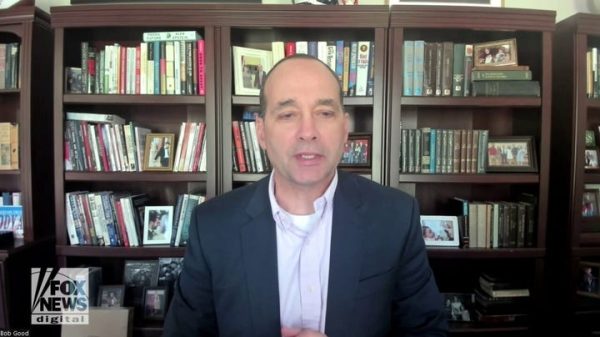Competition is an essential ingredient of capitalism. Accordingly, when a corporation appears to have acquired sufficient market dominance to discourage competitors, it’s tempting to ask the government to remedy the problem by enforcing antitrust laws. That temptation should be resisted, except to redress monopoly power that the government itself has created.
I’ve published several variations on this critique—mostly in connection with the antitrust case against Microsoft during the so‐called browser wars. Today, the critique bears repeating, as the Justice Department pursues its ill‐advised crusade against Apple—for the benefit of competitors at the expense of consumers.
Without constant vigilance by the Justice Department and the Federal Trade Commission, so the argument goes, large corporations would ruthlessly destroy their smaller rivals and raise prices and profits at consumers’ expense. When mega‐companies grab market share, the need for vigorous antitrust enforcement seems obvious. And yet, there’s a dark side to antitrust. The laws, in the words of former Federal Reserve chairman Alan Greenspan, are a “jumble of economic irrationality and ignorance.”
First, antitrust debases the idea of private property, transforming it into something that effectively belongs to the public, to be designed by government officials and sold on terms congenial to corporate rivals who are bent on the market leader’s demise. Some advocates of the free market endorse that process, despite the destructive implications of stripping private property of its protection against confiscation. If new technology is to be declared public property, future technology will not materialize. If technology is to be proprietary, then it must not be expropriated. Once expropriation becomes the remedy of choice, the goose is unlikely to continue laying golden eggs.
The principles are these: No one other than the owner has a right to the technology he created. Consumers can’t demand that a product be provided at a specified price or with specified features. Competitors aren’t entitled to share in the product’s advantages. By demanding that one company’s creation be exploited for the benefit of competitors, or even consumers, government is flouting core principles of free markets and individual liberty.
Second, antitrust laws are fluid, nonobjective, and often retroactive. Because of murky statutes and conflicting case law, companies never can be quite sure what constitutes permissible behavior. Conduct that is otherwise legal somehow morphs into an antitrust violation. Normal business practices—price discounts, product improvements, exclusive contracting—become violations of law. When they’re not accused of monopoly price gouging for charging too much, companies are accused of predatory pricing for charging too little, or collusion for charging the same.
Third, antitrust is based on a static view of the market. In real markets, sellers seek to carve out mini‐monopolies. Profits from market power are the engine that drives the economy. So, what might happen in a utopian, perfectly competitive environment is irrelevant to the question whether government intervention is necessary or appropriate. The proper comparison is with the marketplace that will evolve if the antitrust laws, by punishing success, eliminate incentives for new and improved products. Markets move faster than antitrust laws could ever move. Consumers rule, not producers. And consumers can unseat any product and any company no matter how powerful and entrenched. Just ask WordPerfect or Lotus or Polaroid.
Fourth, antitrust remedies are designed by bureaucrats who don’t understand how markets work. Economic losses from excessive regulation can do great damage to producers and consumers. But government moves forward in the name of correcting market imperfections, apparently without considering the consequences of government intervention. Proponents of antitrust tell us that government planners know which products should be withdrawn from the market, no matter what consumers actually prefer. The problem with that argument is that it leads directly to paternalism, to the idea than an elite corps of experts knows our interests better than we do—and can regulate our affairs to satisfy those interests better than the market does.
The real issue is not whether one product is better than another but who gets to decide—consumers, declaring their preferences by purchases in the market or specialists at the Justice Department or the Federal Trade Commission rating the merits of various goods and services. When we permit government to make such decisions for us, and we allow those decisions to trump the subjective choices of consumers, we abandon any pretense of a free market. In the process, we reduce consumer choice to a formalistic appraisal centering on technical features alone, notwithstanding that products are also desired for quality, price, service, convenience, and a host of other variables.
Fifth, antitrust law is wielded by business rivals and their allies in the political arena. Instead of focusing on new and better products, disgruntled rivals try to exploit the law—consorting with members of Congress, their staffers, antitrust officials, and the best lobbying and public relations firms that money can buy. Soon enough, the targeted company responds in kind—using political influence to bring down competitors. That agenda will destroy what it sets out to protect. Politicians are mostly order takers. Therefore, we’ll get the kind of government we ask for—including oppressive regulation. Citizens who are troubled by huge corporations dominating private markets should be even more concerned if those same corporations decide that political clout better serves their interest—politicizing competition to advance the private interests of favored competitors.
Sixth, barriers to entry are created by government, not private businesses. Under antitrust law, the proper test for government intervention is whether barriers to entry foreclose meaningful competition. But what is a “barrier”? When a company advertises, lowers prices, improves quality, adds features, or offers better service, it discourages rivals. But it cannot bar them. True barriers arise from government misbehavior, not private power—from special‐interest legislation or a misconceived regulatory regimen that protects existing producers from competition. When government grants targeted tax benefits, subsidies, insurance guarantees, and loans, or enacts tariffs and quotas to protect domestic companies from foreign rivals, that creates the same anti‐competitive environment that the antitrust laws were meant to foreclose. That’s how barriers to competition are born and nurtured at public expense. The obvious answer, which has little to do with antitrust, is for government to stop creating those barriers to begin with.
Seventh, antitrust will inevitably be used by unprincipled politicians as a political bludgeon. Too often, the executive branch has exploited the antitrust laws to force conformity by “uncooperative” companies. Remember when President Nixon used the threat of an antitrust suit against the three major TV networks to extort more favorable media coverage. On a widely publicized tape, Nixon told his aide, Chuck Colson, “Our gain is more important than the economic gain. We don’t give a goddamn about the economic gain. Our game here is solely political.” If Nixon were the only culprit, that would be bad enough. But today’s crusade against Apple suggests that the Biden administration seeks political dividends by attacking a huge and immensely rich corporation, notwithstanding the economic toll. The lesson is clear: the threat of abusive public power is far larger than the threat of private market power.
More than two centuries ago, in the Wealth of Nations, Adam Smith observed that “People of the same trade seldom meet together … but the conversation ends in a conspiracy against the public or in some contrivance to raise prices.” Coming from the father of laissez faire, that warning has often been cited by antitrust proponents to justify all manner of interventionist mischief. Those same proponents, whether carelessly or deviously, rarely mention Smith’s next sentence: “It is impossible indeed to prevent such meetings, by any law which either could be executed, or would be consistent with liberty and justice.”




























